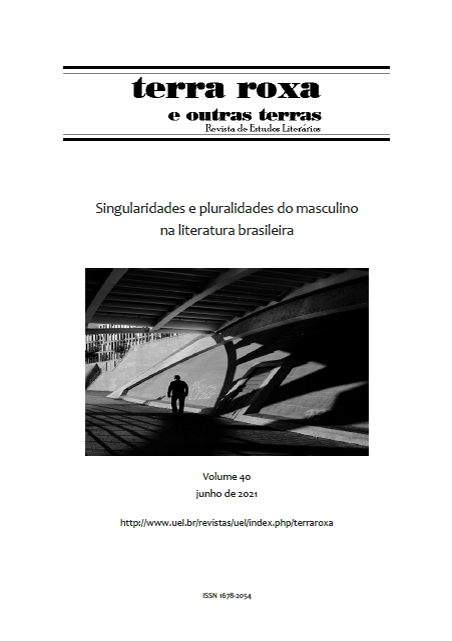Taboo and love: the male affectivity in "Viagem de núpcias" by Rubem Fonseca
DOI:
https://doi.org/10.5433/1678-2054.2021v40p23Keywords:
Love, Masculinities, Taboo, Brazilian short storiesAbstract
This article develops an analysis about "Viagem de núpcias" Rubens Fonseca's short stories. In the analysis, the taboo issue is discussed, considering that main character can't get sexual intercourse with his wife, due to excessive respect he had for her, althought he is a man that accumulates several sexual experiences. At this point, we also approach about men's studies investigating to what extent this taboo affects subject's sexuality. The loving theme is thought in a contrasting perspective to fleeting and cumulative relationships, becoming the predominant paradigm in contemporary society. Finally, this way of relationships doesn't prove the competence about a sexuality linked to loving and affective scopes, but just fortuitous experiences.Downloads
References
BARTHES, Roland. Aula do dia 27 de abril de 1977. Como viver junto: simulações romanescas de alguns espaços cotidianos: cursos e seminários no Collège de France (1976-1977). Trad. Leyla Peronne-Moisés. 2 ed. São Paulo: Martins Fontes, 2013. 237-253.
BAUMAN, Zygmunt. Amor líquido: sobre a fragilidade dos laços humanos. Trad. Carlos Alberto Medeiros. Rio de Janeiro: Jorge Zahar, 2004.
FONSECA, Rubem. 64 contos de Rubem Fonseca. São Paulo: Companhia das Letras, 2004.
GIDDENS, Anthony. A transformação da intimidade: sexualidade, amor e erotismo nas sociedades modernas. Trad. Magda Lopes. São Paulo: EDUNESP, 1993.
GOLDENBERG, Mirian. O macho em crise: um tema em debate dentro e fora da academia. Mirian Goldenberg, org. Os novos desejos: das academias de musculação às agências de encontros. Rio de Janeiro: Record, 2000.
NOLASCO, Sócrates. A desconstrução do masculino. Rio de Janeiro: Rocco, 1995.
Downloads
Published
How to Cite
Issue
Section
License
Copyright (c) 2021 Terra Roxa e outras Terras

This work is licensed under a Creative Commons Attribution 4.0 International License.
Authors who publish in this journal agree to the following terms:
a) The authors retain the copyright and grant the journal the right of first publication, the work being simultaneously licensed under the Creative Commons Attribution-NonCommercial 4.0 International License, allowing the sharing of the work with acknowledgment of the authorship of the work and initial publication in this journal.
b) Authors are authorized to assume additional contracts separately, for non-exclusive distribution of the version of the work published in this journal (eg, publish in an institutional repository or as a book chapter), with acknowledgment of authorship and initial publication in this journal.
c) Authors are allowed and encouraged to publish and distribute their work online (e.g. in institutional repositories or on their personal page) after the editorial process, as this can generate productive changes as well as increase impact and citation of the published work (See The Effect of Open Access).
d) The authors of the approved works authorize the journal to, after publication, transfer their content for reproduction in content indexers, virtual libraries and the like.
e) The authors assume that the texts submitted for publication are of their original creation, taking full responsibility for their content in case of any objection by third parties.



















